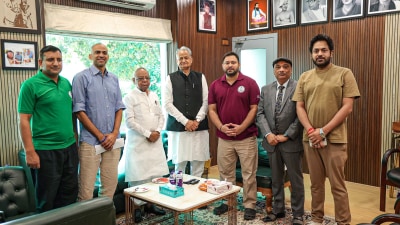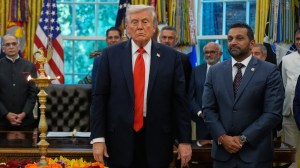US rushes Albright to Geneva to discuss proposals
WASHINGTON, November 19: Foreign ministers of Britain, France, Russia and the United States today headed for Geneva for urgent talks on the...

WASHINGTON, November 19: Foreign ministers of Britain, France, Russia and the United States today headed for Geneva for urgent talks on the Iraqi-United Nations crisis in the light of the hope expressed by Russian mediation to “avert an armed confrontation” and solve the impasse.
Iraq, however, reiterated its “legitimate demands” in the stand-off with the world body saying, “Baghdad has nothing to concede on its demands whether by dialogue or without.”
US Secretary of State Madeleine Albright, meanwhile, cut short her visit to India by few hours and scrapped a meeting with Egyptian President Hosni Mubarak in Cairo to be in Geneva to attend the crucial talks.
Iraq’s deputy premier Tariq Aziz, who concluded his Moscow visit today, carried a personal letter from Russian President Boris Yeltsin for Iraqi President Saddam Hussain but the contents of the letter were not made available.
Aziz earlier met Yeltsin and held talks with Russian Foreign Minister Yvgeny Primakov who said after the meeting that there was hope for mediation to succeed. Primakov, who has already arrived in Geneva for the meet, said, “I am expecting a great deal from today’s meeting”.
The Russian plan includes, “Iraq complying with the UN resolutions,” Primakov said immediately after his arrival in Geneva, adding, “At the same time the work of the special commission must continue”.
Iraq’s ruling Baath Party newspaper Al-thawra said in a front page editorial that “Iraq’s demands are legitimate and if there is a diplomatic effort or dialogue, these demands should be its solid base”.
Iraq’s demands, presented by Aziz to the UN General Secretary Kofi Annan two weeks ago, also called for replacing US spy planes operating on behalf of the UN with those of another country.
In Washington, President Bill Clinton did some tough talking saying it will not negotiate with Iraq while indirectly the US was doing just that. US earlier ordered US F-117 stealth fighters and B-52 bombers to the Gulf in a major deployment that could grow to as many as 45 combat aircraft in the coming days, Pentagon said.
Clinton, amidst intense diplomatic efforts to resolve the crisis peacefully, authorised the deployment partly in response to threatening movements of Iraqi Sam Missile Batteries in southern Iraq, reports from Washington said.
Speculating a possible strike against Iraq, Britain’s Defence Secretary George Robertson in London said Harrier Jump jets will be sent to HMS invincible in preparation for a possible military strike against Iraq.
Royal Air Force Harrier GR-7 aircraft, described as “a very potent aircraft optimised for low level night attack,” will join the Mediterranean later this week. However, Britain has not taken any decision to deploy these to the Gulf.
France, a party to tomorrow’s crucial talks on defusing the crisis, tried to convince Iraq to cooperate with the UN inspection team. French ambassador to the UN said Iraq should be convinced that there is “light at the end of the tunnel” if it cooperated with the arms inspection team. The team was currently cooling its heels at Manama, Bahrain and unless it was reconfigured with reduced US representation there appeared to be no hope for its return to Baghdad.
Hundreds of people including women and children formed human shields around important installations in Bagdhdad including presidential palace and factories to deter the US from carrying out any surprise bombardment.



- 01
- 02
- 03
- 04
- 05




























